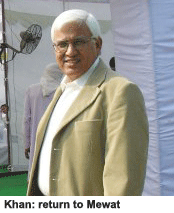 Mehmood Khan is managing trustee of the Rasuli Kanwar Khan Trust (RKKT), a non-profit organisation engaged in educating the people of Mewat (Haryana) on issues relating to water management, healthcare, sanit-ation and education, especially of girl children and women. RKKT was constituted by Khan and his wife Sanobar in 2006.
Mehmood Khan is managing trustee of the Rasuli Kanwar Khan Trust (RKKT), a non-profit organisation engaged in educating the people of Mewat (Haryana) on issues relating to water management, healthcare, sanit-ation and education, especially of girl children and women. RKKT was constituted by Khan and his wife Sanobar in 2006.
Newpeg. On March 20 the NaiNangla Centre, Mewat, equipped with 50 sewing machines to train rural women to manufacture high quality branded garments under the AMRIT (apparels manufacturing rapid induction training) programme conceptualised by Delhi-based entrepreneur Harminder Sahni, became operational with an initial batch of 70 girls/women. Under RKKT’s development model, Sahni’s proprietory firm will market the garments produced in India and abroad. “We believe this model centre which will take factories to villages could solve rural India’s low-income generation and unemployment problems,” says Khan.
History. Born into a landed family in NaiNangla village in Mewat district, Khan is an alumnus of the Haryana Agricultural University, Hisar and IIM-Ahmedabad who began his profess-ional career in the BAIF Development Research Foundation in 1977 and later signed up with the London-based Unilever Plc, where he served in various capacities in Holland, Singapore and several countries for 29 years including 11 years (1998-2009) as the ‘global leader of innovation process’. In 2003, a chance meeting in London with Madhav Chavan, promoter-CEO of Pratham, the well-known Mumbai-based NGO which publishes the Annual Status of Education Report, made Khan aware of the shockingly low literacy percentage of women in his native Mewat district.
“It was a moment of awakening for me and prompted promotion of the RKK Trust with a corpus of Rs.2 crore — my life’s savings — in 2006. In 2009 when I retired from Unilever, I returned to NaiNangla with my wife Sanobar to work full time with RKKT,” recounts Khan.
Since then the trust has promoted three K-12 schools with an aggregate enrolment of 600 boys and 200 girls in collaboration with the Delhi-based Educomp Solutions Ltd, with five more schools to become operational this year. Moreover the trust operates literacy and vocational training centres equip-ping batches of 240 girl children with basic literacy and income-generating skills. “Since the trust began its literacy and training drive in 2003, women’s literacy in 1,200 villages in and around Mewat district has risen from 3 percent to 94.7 percent,” he says.
Future plans. According to Khan, RKKT’s development model is to focus on educating children, the girl child in particular, while inviting collaborations from educators and industry to develop literacy, skills-building and for-profit, low-cost business enterprises. “We believe in collaboration, co-creation and co-operation and extend an open invitation to all those interested in trans-forming rural India into the world’s largest market to join with us. It’s a win-win model,” says Khan.
Payal Mahajan (Delhi)